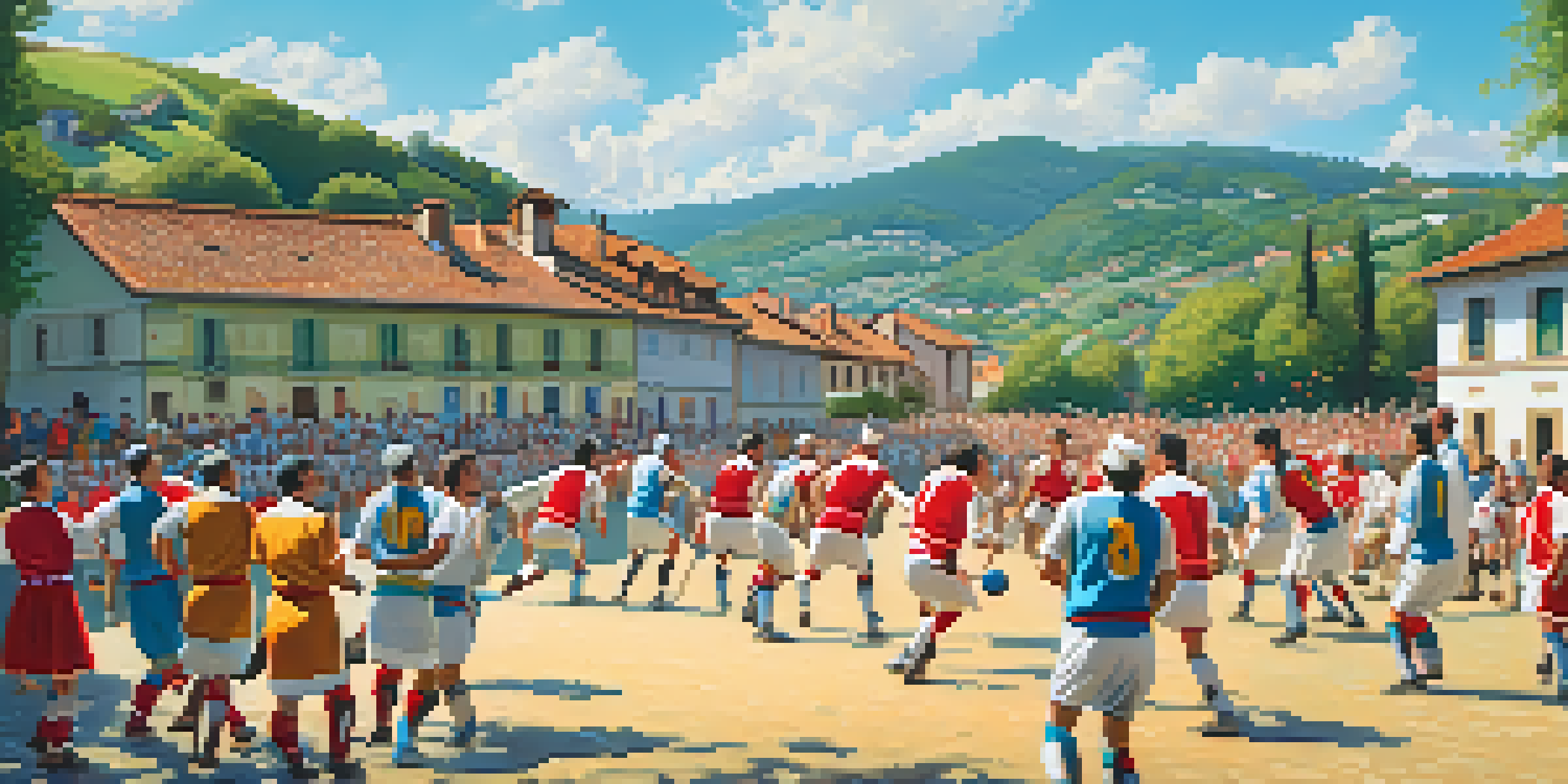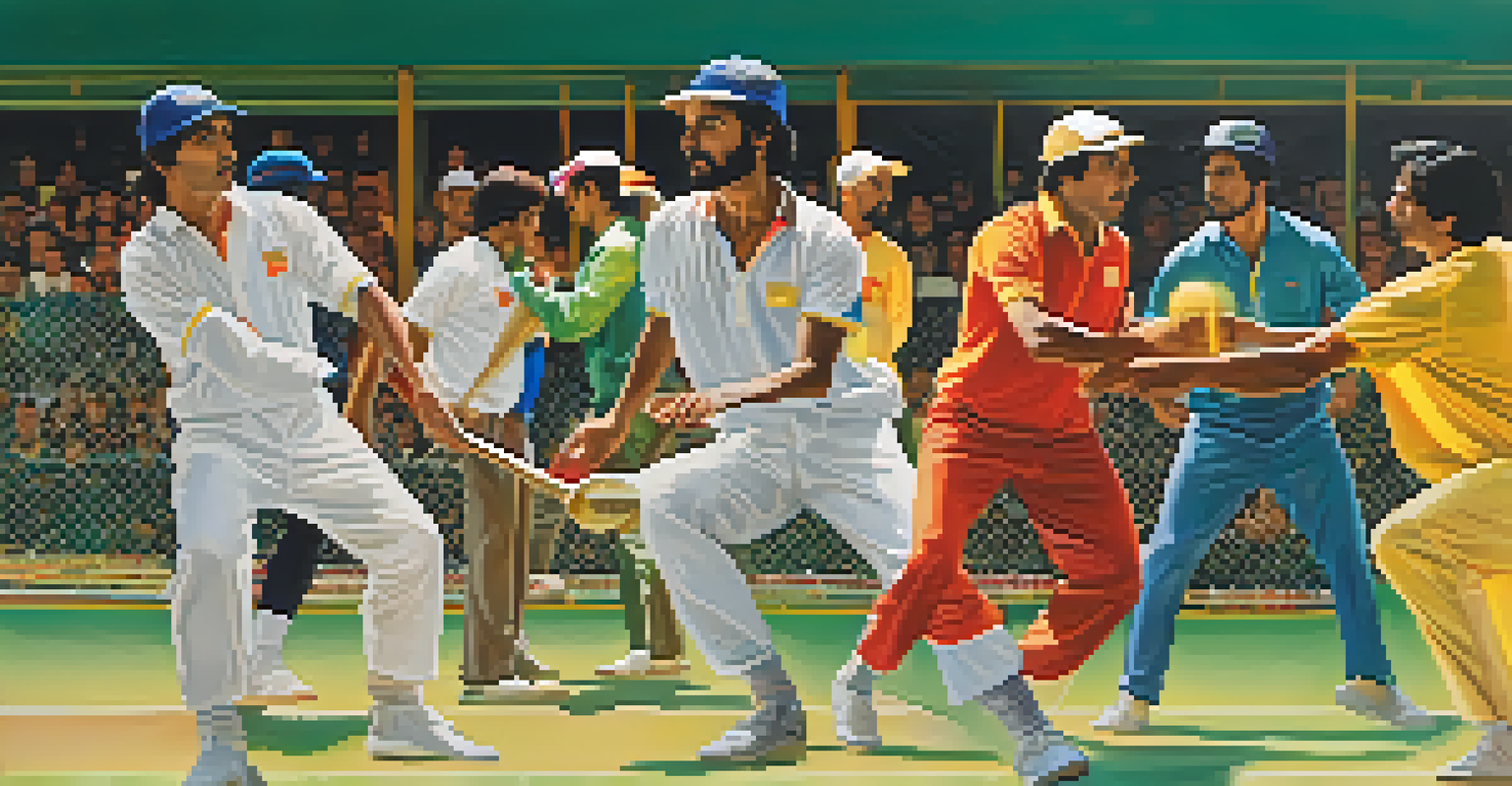Exploring the Rich History of Pelota in Spanish Culture

The Origins of Pelota: A Glimpse into its Past
Pelota, a beloved sport in Spain, boasts origins that date back centuries. It is widely believed to have evolved from ancient ball games played by the Romans and the Basques. These early versions laid the groundwork for what we now recognize as various forms of pelota.
Sports fosters community and connection, bridging gaps across cultures and generations.
The sport gained traction in the 19th century, particularly in the Basque Country, where it became a significant part of local culture. Villages would host matches, transforming pelota into more than just a game; it became a community event that fostered local pride. The enthusiasm surrounding pelota helped it flourish and evolve into distinct styles.
As pelota spread across Spain, different regions adapted the game to their unique cultures. This resulted in diverse versions, such as 'jai alai' and 'pelota vasca,' each with its own set of rules and playing styles, showcasing the rich tapestry of Spanish heritage.
The Cultural Significance of Pelota in Spain
Pelota is more than just a sport; it represents a vital aspect of Spanish identity. It often serves as a focal point for community gatherings, where locals unite to cheer on their teams. This communal spirit reinforces social bonds and creates a shared sense of belonging among spectators and players alike.

Historically, pelota has also played a role in Spanish art and literature. Numerous artists have captured the essence of the game in their works, reflecting its importance in the cultural landscape. This artistic representation has helped solidify pelota's status as a symbol of regional pride, especially in the Basque Country.
Pelota's Rich Cultural Heritage
Pelota is deeply rooted in Spanish culture, serving as a significant community event that fosters local pride and social bonds.
Moreover, pelota has been embraced by various generations, from children learning the game in the streets to seasoned players competing professionally. This generational continuity highlights how pelota transcends age, bringing people together through a shared passion.
Understanding the Different Variants of Pelota
Pelota manifests in several exciting forms, each with its own distinct characteristics. The most well-known variant is 'jai alai,' which features a unique curved racket called a 'cesta' used to throw the ball at high speeds against a wall. This fast-paced version has garnered international attention and is played in front of large audiences.
Tradition is not the worship of ashes, but the preservation of fire.
Another popular form is 'pelota vasca,' which can be played in various settings, including indoor courts. It features several disciplines, such as 'remonte' and 'frontón,' each utilizing different techniques and equipment. This diversity allows players to express their skills in unique ways, adding to the sport's allure.
These variants not only showcase the adaptability of pelota but also highlight regional differences in play style and equipment. As enthusiasts explore these different forms, they gain a deeper appreciation for the sport's cultural richness and enduring legacy.
Pelota: A Sport of Skill and Strategy
At first glance, pelota may seem like a simple ball game, but it requires a remarkable level of skill and strategy. Players must master various techniques, such as accurate throwing, catching, and quick reflexes. Every match showcases athleticism, precision, and an understanding of the game’s dynamics.
Strategically, players must anticipate their opponents' moves, making split-second decisions that can determine the outcome of a match. This mental aspect of the game is just as crucial as physical prowess, making pelota a fascinating blend of mind and body. The thrill of watching players outwit each other adds to the excitement for spectators.
Diverse Variants of Pelota
The sport features several exciting forms, including 'jai alai' and 'pelota vasca,' each showcasing unique techniques and regional styles.
Additionally, teamwork plays a vital role in many variants of pelota, where players must communicate effectively and coordinate their efforts. This collaboration fosters camaraderie and enhances the overall experience, making every match a spectacle of skill and strategy.
Pelota's Influence on Spanish Social Life
Pelota has woven itself into the fabric of Spanish social life, influencing everything from festivals to family gatherings. Local tournaments often coincide with regional celebrations, showcasing the sport as a centerpiece of community spirit. These events encourage participation and draw in spectators, reinforcing the bond between residents.
Moreover, pelota serves as a gateway to intergenerational connections, with older players passing down their knowledge to younger generations. This mentorship not only preserves the sport's techniques but also fosters respect for tradition and history. Families often bond over watching or playing pelota together, creating lasting memories.
As a reflection of Spanish values, pelota embodies a commitment to community, tradition, and shared enjoyment. Its role in social life underscores the importance of sport as a unifying force, bringing people together regardless of age or background.
The Global Reach of Pelota
While pelota has deep roots in Spain, its appeal has extended far beyond its borders. Countries such as France, Mexico, and the United States have embraced various forms of the game, adapting it to their cultural contexts. This global reach has sparked interest and appreciation for the sport internationally.
In recent years, professional pelota leagues have emerged in several countries, showcasing elite talent and expanding the sport's audience. These leagues not only elevate the level of competition but also introduce new fans to the rich history and cultural significance of pelota.
Global Growth and Future of Pelota
As pelota expands internationally, it balances tradition with modern influences, ensuring its continued relevance and connection among diverse communities.
The globalization of pelota highlights the sport's adaptability and universal appeal. As it crosses cultural boundaries, pelota continues to foster connections among diverse communities, proving that the love for the game transcends language and geography.
The Future of Pelota: Preserving Tradition Amid Change
As pelota evolves, there is a growing focus on preserving its rich traditions while adapting to modern influences. Many clubs and organizations are dedicated to promoting the sport, ensuring that younger generations remain engaged. This commitment to preservation is crucial for maintaining the sport's cultural significance.
Additionally, technology plays a pivotal role in the future of pelota. With advancements in broadcasting and social media, matches can reach wider audiences, attracting new fans and players. This modern approach helps to keep the sport relevant and appealing in an ever-changing entertainment landscape.

Ultimately, the future of pelota hinges on balancing tradition with innovation. By honoring its roots while embracing new opportunities, pelota can continue to thrive, ensuring that this cherished sport remains an integral part of Spanish culture for years to come.